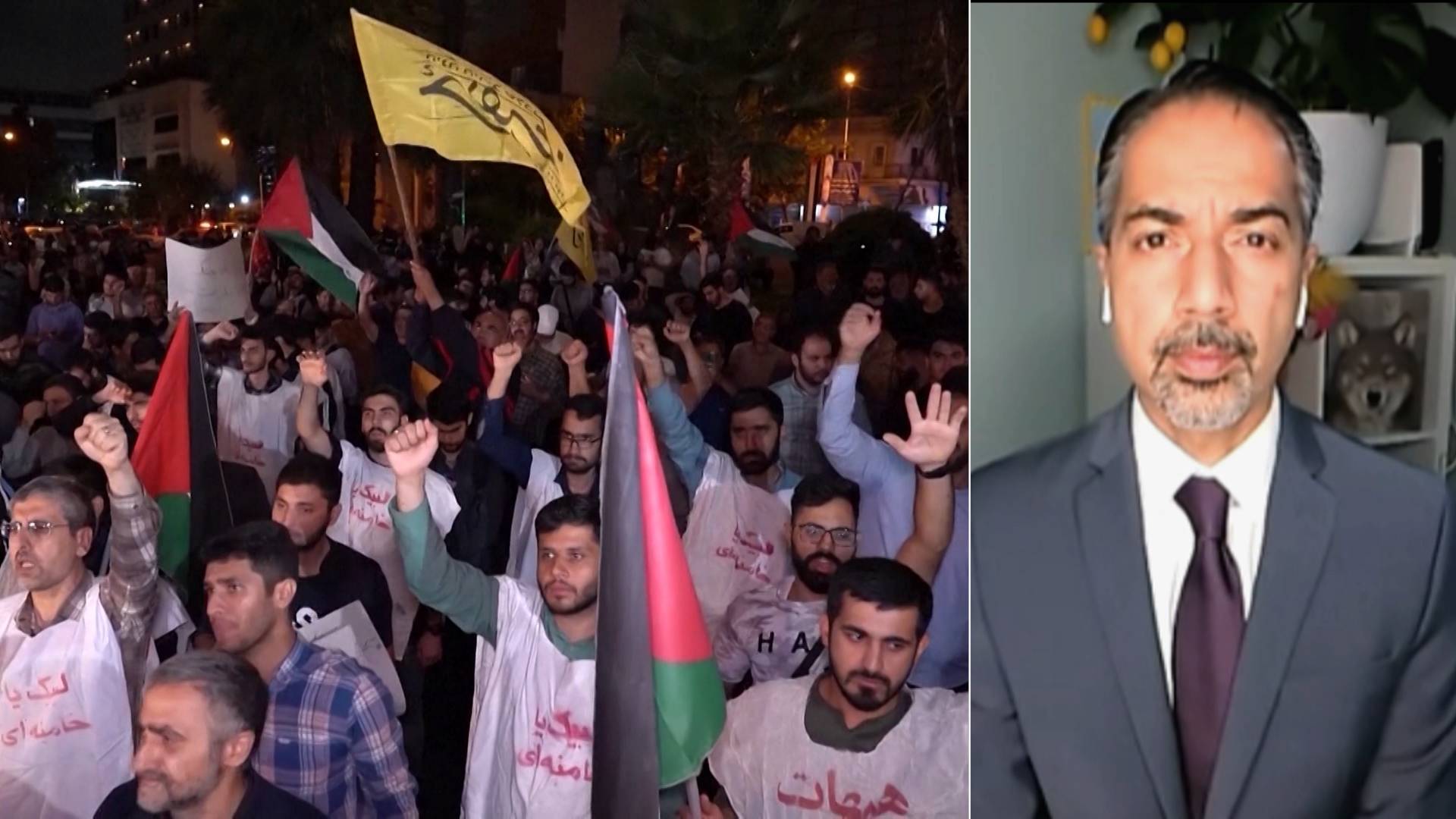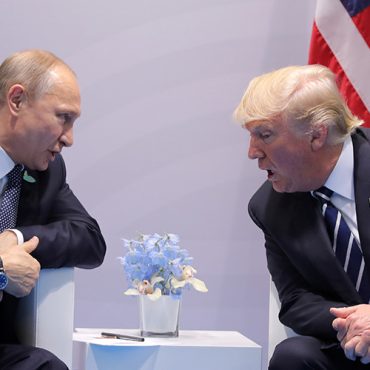This is a rush transcript. Copy may not be in its final form.
AMY GOODMAN: This is Democracy Now! We’re going to turn to Washington, D.C., right now for more on all of this, to look at how Iran could respond to the Israeli strike Friday in Lebanon that killed the Hezbollah leader Hassan Nasrallah. We go to Trita Parsi, executive vice president of the Quincy Institute for Responsible Statecraft. He’s just written a piece for Zeteo headlined “Nasrallah Assassinated: What Happens Next?”
Trita, thanks for joining us again. What happens next? And can you respond to the assassination of the longtime Hezbollah leader — since what? 1992 — Hassan Nasrallah?
TRITA PARSI: So, a lot of eyes are, of course, on Iran and trying to figure out what Iran is going to do next. But we have to recognize that Israel has quite successfully cornered Iran. Iran played the long game, tried to avoid a direct confrontation with Israel, absorbed a lot of hits, but in the process of playing the long game, its options have become fewer, weaker and more dangerous. At this point, if Iran does almost anything, it will risk triggering the larger regional war that Netanyahu wants and that the Iranians have tried to avoid.
As a result, I think our eyes should actually be on what Israel does next, whether it will go through with an invasion — we’re already seeing reports now that some commando raids have been conducted inside of Lebanon by the Israelis, probably in preparation for a land invasion — as well as what Israel plans to do with the Houthis. If it reaches a point in which the Iranians conclude that Israel’s strategy is to take out some of these entities before going to Iran itself, that may trigger the Iranians to act now in the hope of actually having better options now rather than waiting.
But other than that, the Iranians seem to be of the mindset that they do not want to get in a direct engagement because of their own internal problems. Iran is faced with a significant anger from the population over the abuse and repression of the Iranian regime, particularly in the protests of two years ago. It does not believe that it actually can afford a war of this kind. Instead, its priorities are to try to see if it can get a deal with United States on the nuclear issue, reduce tensions, lift some of the sanctions, improve the economy, in order to reduce the distance between the society and the government. The last thing they want in that context is a war with Israel that will most likely increase that distance and the anger of the population.
AMY GOODMAN: In addition to the assassination of Hassan Nasrallah on Friday, Israel killed the head of the Islamic Revolutionary Guard Corps, the deputy commander Abbas Nilforoushan, who was killed in that Nasrallah strike, a seminal or a key figure in the Iran-Iraq War. Can you talk about his significance and then the role of the new Iranian president, seen as a reformist?
TRITA PARSI: So, Iran has taken quite a lot of hits. Nilforoushan is just the latest commander that has been killed by the Israelis, not just since October 7th, but over the course of several years, in Syria and in Lebanon itself. And this is part of their long game in terms of not necessarily reacting to each and every one of these, because they know that Israel is in a stronger position and Israel has an interest of having a confrontation sooner rather than later.
But again, that strategy, that long-term strategy, only works if there’s also a short game. And Iran’s short game seems to be losing right now, given how Israel has managed to crack the communications system of Hezbollah, take out the top echelon of its commanders and put Hezbollah in a very, very weak position.
AMY GOODMAN: So, the U.S. struck Hodeidah in Yemen. And the Houthis, now the question is how they will respond. Can you talk about Iran’s relationship with the Houthis, with Hamas and with Hezbollah?
TRITA PARSI: I think one of the things that has not been acknowledged, at least not in the Western narrative, about October 7th is that it clearly came at a very bad time for the Iranians and for Hezbollah itself. I think, actually, there’s been privately quite a lot of irritation in Tehran with Hamas, because it obviously did not coordinate any of that with the Iranians. The Iranians, Hezbollah were not even aware of the plans that Hamas had for that attack. And the reason, again, is because it forced a confrontation with Israel at a much earlier stage than what the Iranians and Hezbollah were ready for. Lebanon’s economy was in complete disaster. Iran had its own problems. They were not looking for a fight. Hamas’s calculation was completely different.
And it also shows you the distance that does exist between these different entities. Iran and Hezbollah are much, much closer to each other, whereas Hamas is a more recent addition to Iran’s axis and a very problematic one in terms of their relationship. They have had several fallouts. Hamas originally was quite a strong enemy of Iran. Then you have the Houthis, who is a very different entity, does its own thing, is part of the axis, essentially, but has made it very clear it is not taking any orders from Iran. It’s been quite critical publicly of Iran, arguing that Iran has been far too risk-averse and that Iran should have entered into this fight much, much sooner, rather than watching from afar and not aiding Hamas and Hezbollah and the Houthis to an extent that they believe that Iran should have.
AMY GOODMAN: I want to finally ask about — the same question I put to Gideon Levy in Tel Aviv, Trita. You’re Iranian American. You’ve been writing extensively books on U.S., Iranian, Israel policy. Among your books, Losing an Enemy: Obama, Iran, and the Triumph of Diplomacy, your first book Treacherous Alliance: The Secret Dealings of Iran, Israel, and the United States. Do you feel that the Israeli prime minister is attempting to pull Iran into a war with the United States, as the number one sponsor, the United States, of the military in Israel?
TRITA PARSI: I don’t think there is any doubt that that is Netanyahu’s game plan. And the reason why he has been successful in the last couple of weeks is not because of any particular action by the Israelis — although, of course, they’ve scored some major successes. It’s because of the posture of the Biden administration. Biden has chosen to be so deferential, more deferential than any other American president has been to Netanyahu. And as a result, despite all of the talk of wanting to avoid a larger regional war, which clearly is in the U.S. interest to avoid, Biden has adopted a posture in which he essentially says that that’s what he wants to avoid, but then he provides the Israelis with the weapons, the political protection, the diplomatic support and the arms and money to be able to pursue exactly the escalation that Biden says that he does not want.
That’s the big difference that has happened here now, that the United States has now, under Biden, chosen to completely be in support of whatever Netanyahu wants to do. And Netanyahu’s plan for quite some time has been to reverse the balance in the Middle East, to make sure that Israel is once again enjoying a much stronger and favorable position in the region by cutting down many of the different challengers to Israel that exist in the region. Reversing that balance is not something that Israel can do on its own. It can only do so by bringing in the United States into the war, whether it is directly or in the manner that Biden has been supporting everything that Israel is doing.
AMY GOODMAN: I mean, you have U.S. troops. You have the warships in the eastern Mediterranean, in the Gulf. You have U.S. soldiers in Jordan, around 50,000 overall U.S. soldiers in the area. If this is intensified, how do you see this playing out in the U.S. election? Do you actually think — I mean, after Netanyahu addressed the U.S. Congress and got more applause than any president in U.S. history — what, more than 50 standing ovations — he went down to Mar-a-Lago to meet with Trump — this will serve Trump in this election?
TRITA PARSI: Whether one thinks that Trump is going to be different or not from what Biden has done or what Harris may do, reality is, I think, that if you have this explosion taking place in the region with the U.S. itself getting dragged into the war before the elections, it will serve Trump. The Biden administration have gone out and said that they’ve been working 24 hours without any rest to try to secure a ceasefire for more than 10 months now, and they have absolutely nothing to show for it except for constantly giving Israel more weapons and arms.
And if that may not push away some of the more loyal supporters of the centrist elements of the Democratic Party, I think it does significantly risk losing a lot of the people who have been on the fence, who have given Biden the benefit of the doubt, certainly were willing to give Kamala Harris the benefit of the doubt. But if this disaster happens, I think those voters, that voting bloc — which I’m not talking about the Arab Americans or the Gen Z or the Muslim Americans, but that other voting bloc that is more on the fence on this — they may also be lost as a result of this.
AMY GOODMAN: Trita Parsi, I want to thank you for being with us, executive vice president of the Quincy Institute for Responsible Statecraft. We’ll link to your piece in Zeteo, “Nasrallah Assassinated: What Happens Next?” Author of a number of books, including Losing an Enemy: Obama, Iran, and the Triumph of Diplomacy.
Next up, Hurricane Helene tears through the southeastern United States as scientists say climate change rapidly intensifies hurricanes. We’ll speak with climate activist and scientist Peter Kalmus in North Carolina, one of the states hit hardest by the storm. Stay with us.
[break]
AMY GOODMAN: “Third World War” by Kris Kristofferson. The politically conscious singer and actor died Saturday at the age of 88. He once said, quote, “I was in Nicaragua with the Sandinistas. I’ve argued for Leonard Peltier, Mumia Abu-Jamal, the United Farm Workers. I’ve been a radical for a long time. I guess it’s too bad. I’d be more marketable as a right-wing redneck. But I got into this to tell the truth,” Kris Kristofferson said.











Post comments (0)